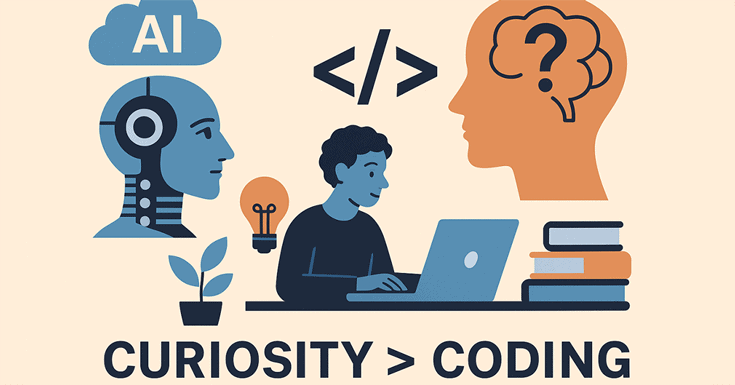Curiosity > Coding: What Really Matters for Careers in the AI Era
Tambellini Author

According to the World Economic Forum (WEF), AI is projected to displace 9 million jobs by 2025 but also create 11 million new ones. That net gain is the story many headlines miss. And it’s the key to how we should prepare our children (and ourselves) for the future.
Recently, I’ve been hearing the same question from parents and friends:
“What should my child study to secure a job in the age of AI?”
It’s a fair question. After all, the WEF’s Future of Jobs Report 2025 shows that 40% of employers expect to reduce their workforce where AI can automate tasks. But that’s only part of the story. The same report shows AI will also create millions of new roles. The challenge, then, isn’t just about what’s being replaced; it’s about what’s being reimagined.
So, how do we prepare for jobs that don’t exist yet? What should we be studying, not just in school, but throughout our lives?
Let me offer a perspective from my own experience and what I’ve learned from others navigating similar paths.
The Question Behind the Question
What makes someone adaptable in a world of rapid change?
As someone who transitioned from physics to data science and AI, and shifted careers from scientific research to consulting across industries, I’ve spent a lot of time thinking about that question. Looking back, it wasn’t foresight about AI’s rise that made those transitions possible. It was something deeper:
Curiosity.
I still remember wrestling with Schrödinger’s equation in grad school, trying to make sense of the world at its most fundamental level. When machine learning emerged as a new frontier, I was drawn to it by the same hunger to understand why and how. Neural networks felt like just another system to decode.
And I’ve seen the same pattern in others: people from literature, music, or education, who’ve reinvented themselves in tech, UX, product, and beyond. What they all had in common wasn’t a specific degree or coding bootcamp.
It was the drive to learn.
The Skills That Actually Matter
The same WEF report also highlights that the most in-demand skills of the near future include:
- Resilience
- Self-motivation
- Curiosity
- Lifelong learning
Notice what’s not on that list? Any particular programming language.
These are meta-skills, skills that help you build other skills. And they’re more valuable than ever.
Reflecting on my own journey, here’s what carried over, not just between jobs, but across industries:
- Mathematical thinking: Gave me the framework to understand algorithms and probability.
- Problem-solving habits: Helped me break complex challenges into manageable steps.
- Comfort with uncertainty: Trained me to make decisions with incomplete data.
- Learning how to learn: Built the muscle for continuous reinvention.
Yes, technical skills matter, but they’re the tools, not the foundation. The foundation is your capacity to adapt.
What I’d Look for in a University If I Were a Student (or a Parent)
If I were choosing a university today, for myself or my child, I wouldn’t just ask:
“What degree leads to a good job?”
I’d ask:
“Is this institution preparing students to learn, adapt, and evolve?”
Here’s what I’d want to see:
Are they teaching future-ready skills?
Universities should integrate AI not just as a subject but as a tool to enhance creativity, critical thinking, digital literacy, and problem-solving. The most forward-thinking ones are already doing this and seeing better outcomes as a result.
Are students learning to work with AI?
Rather than fearing replacement, students should be taught to collaborate with AI through prompt writing, ethical reasoning, and asking the questions machines can’t answer. Are they learning to learn, even as the tools evolve?
Are they investing in what makes us human?
As AI takes over repetitive tasks, success will depend on distinctly human traits like empathy, creativity, judgment, and communication. The best programs still prioritize these timeless strengths.
Looking Forward
You don’t need to predict the future to be ready for it.
But you do need to keep learning.
So when people ask me what their kids should study, my answer isn’t about majors. It’s about mindsets. Seek out institutions and environments that cultivate adaptability, curiosity, and the confidence to grow.
In a world of accelerating change, these aren’t just nice-to-have.
They’re your career insurance.
Let’s Talk
What’s your strategy for staying adaptable in an AI-driven world?
Have you discovered hidden strengths in your own background that proved unexpectedly valuable?
I’d love to hear your story.
You May Also Like
- Digital Tools and the Growth Mindset: Fostering Lifelong Learners
- What Does IT Do Today? Responding to Higher Education’s New Reality
- [Webinar] “Navigating the Ambiguity”: Through Radical Efficiency and Agility
Originally posted by Alpha Hamadou Ibrahim on LinkedIn. Be sure to follow him there to catch all his great industry insights.
Categories
Share Article:

Other Posts From this Author:
© Copyright 2026, The Tambellini Group. All Rights Reserved.